No One Cares About Venenzuela
To imply that our increased interest in that country’s affairs has anything to do with the suffering of the people is an obvious lie.
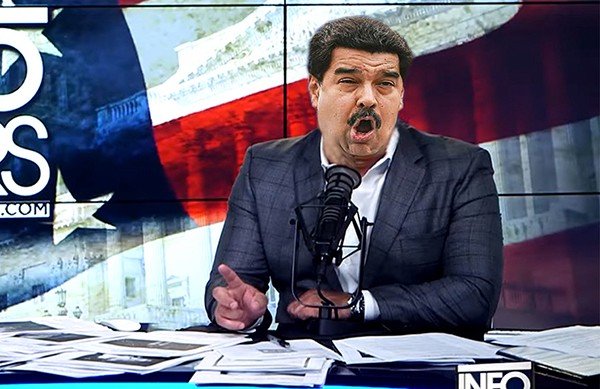
Hello! My name is Adam Tod Brown, and I’m a comedy writer, as if that wasn’t obvious from the title of this column. Look at that! Jokes already!
I’ve also been covering news and politics for a few different outlets for what feels like since the Kennedy administration, but it’s really just been a few years. Most recently, my main job has been owner/operator/lead host at the Unpops Podcast Network, where I host shows about everything from international news and politics to financial crime to the band Nirvana, and so much more.
Before that I wrote a bunch of stuff for Cracked, like this thing about how Ace of Base was maybe (definitely) a white nationalist band. I mean that, by the way. That’s not a comedy article.
I’ve also written for Vice, Playboy, Uproxx, and lots of other places, but nothing as link-worthy as that Ace of Base thing.
Anyway, I figured a brief introduction was in order seeing as how this is my first time writing for Vandal Press. We’ll probably disagree a lot. You’ll at least want a name to attach to your angry messages and such.
Now, with that out of the way, let’s get to the actual topic. The crisis in Venezuela is a story I’ve been following for over a year. I understand that doesn’t exactly make me a historian on the matter, but still, I’ve read some stuff. Enough to know that what’s happening there isn’t quite what the media is making it out to be.
A humanitarian crisis of epic proportions is unfolding in Venezuela right now. That part you probably know already, and that should be your first tip-off that there’s much more to this story than just a dictator being mean to his people.
After all, the list of places where folks are in dire need of humanitarian aid can literally occupy an entire article unto itself, and in a lot of cases, those other crises outpace Venezuela in terms of both death toll and the likelihood that they’ll get much worse before they get better.

Or wait for them all to happen first then binge watch!
Nevertheless, the human rights crisis getting the most attention here in the US is Venezuela. Even Trump who, while campaigning, famously laughed off the same kind of abuses Venezuela is accused of, somehow finds it in his heart to worry about human rights when it comes to this one Latin American nation.
If you find that odd, that’s because it is odd. However, starting any discussion about America’s involvement in Venezuela with Trump is both unfair to Trump and too fair to the administrations that came before him.
In fact, read enough “explainer” articles about the crisis in Venezuela and you’ll find that they almost always start at a point that only tells part of the story. Generally, it’s sometime around when Hugo Chavez was elected in 1998, when he started imposing currency controls in the early 2000s, or when Nicolas Maduro took over after Chavez died. That’s kind of like starting The Matrix right after Tre Styles’ dad explains everything to John Wick, if that makes sense.
From there you hear about the failure and foolishness of the currency controls Chavez put in place back in the day and how corruption is out of control and that people are eating garbage and slaughtering zoo horses for meat and, on top of all that, the government is jailing and maybe even executing political opponents and things will just get worse if Maduro stays in power.
Again, while all of these things are true or at the very least mostly true, starting there adds a seriously unfair slant to the Venezuela story. Specifically, it gives the impression that Venezuela was a once-rich nation brought to the brink of disaster solely through the irresponsible actions of the Chavez/Maduro regime. That’s disingenuous on two counts.
One, it ignores the part where Venezuela became one of the richest nations in the world under Chavez…
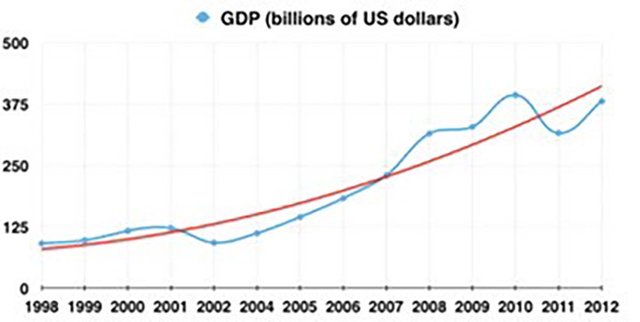
Trust Wikipedia for all your “charts about Venezuela’s GDP under Chavez” needs!
…and in a way that, at least at first, was highly beneficial to the poorest citizens in the country.
Two, it discounts the legitimate role that outside influences, including (and especially) the United States, have played in perpetuating and worsening the crisis. Media outlets tend to treat that suggestion, repeated frequently by the Venezuelan government, as if it’s just the conspiracy theory rantings of a disgraced tyrant. It’s not, and you don’t have to track down the Venezuelan wing of Infowars to find proof.
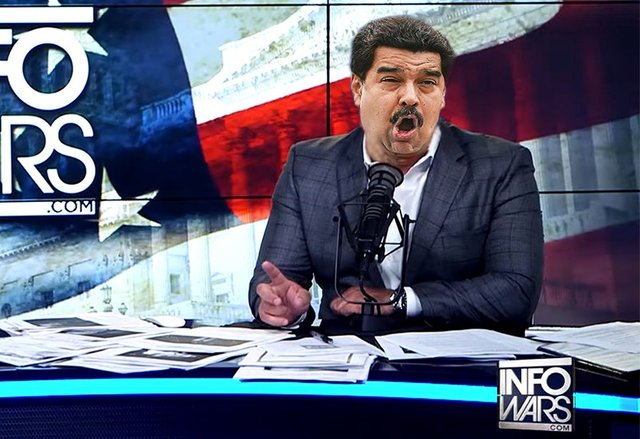
I sometimes think it’s fake anyway.
To understand that part, you should first know a little bit about the government of Venezuela before Chavez. With all the talk of dictatorships and repressive regimes that have ruled there since the tail end of the 20th century, you’d think the populace was flush with viable political candidates before Chavez rode his socialist horse into town and shot all his opponents in the face.
You’d be wrong. For the forty years prior to Chavez, the country was ruled by two parties, both consisting mostly of whites from the “elite” business class of Venezuelan society. Furthermore, these two parties ruled under something called the Puntofijo Pact, an agreement that eventually centralized power in the hands of those parties, Acción Democrática (AD) and COPEI (Social Christian Party), to the exclusion of most others.
“Sure, but at least the people had food to eat under that regime, right?” So glad you asked! No, at various points throughout history, lots of citizens did not. In fact, every mistake, hardship, and atrocity credited to the Chavez/Maduro tandem was present under that previous regime as well.
Just like Chavez, the political machine that ruled the previous four decades relied too heavily on oil revenue and, when prices dropped in the ’80s, the wheels fell off. At the behest of the International Monetary Fund, a series of austerity measures were put in place, and the people of Venezuela suffered mightily as a result. This must have been especially humiliating for voters who responded to then president Carlos Andrés Pérez’s populist campaign dismissals of the IMF being “a neutron bomb that killed people, but left buildings standing.”
There was plenty of oppression and violence as well, with the most notable incident being 1989’s Caracazo.
By that point, inflation in Venezuela was skyrocketing, the value of the currency had bottomed out, and people in the poorest areas of the country were having trouble finding food. It was from that under-represented segment of society that a protest over rising transportation costs started. Lots of others joined in shortly thereafter. When the people started attacking shops and stores looking for food, the military started shooting. Estimates put the number of protesters killed anywhere from 300 to 1,000.
Things definitely did not get better from there, so if you’re wondering how a “tyrant” like Hugo Chavez gains power, don’t wonder too hard. He was elected by the people in a legitimate, democratic election, mostly on the strength of running a populist campaign that appealed to citizens in the poorest parts of the country who felt they weren’t being represented by the candidates from the two ruling parties who’d been taking turns running/ruining things for decades.
Pretty crazy, huh? Can you even imagine voters in the United States making such a radical choice for president on those grounds? Of course you can. It should sound real damn familiar, because potential Russian meddling excluded, that’s pretty much how Trump got elected.

Let’s pause to say “hello” to all the mixed emotions that just joined us!
The ascent of Chavez to the Presidency ushered in the Bolivarian Revolution. It would take a few thousand more words to explain that in detail, so just know that it mainly boils down to one thing — privatization. The previous ruling class was very much in favor of privatization, which is basically code for “keeps American business interests in mind,” at least as it pertains to Latin America.
Chavez did the opposite. He focused on nationalization and a state-run economy and lessening American influence over Venezuelan affairs … exactly the kind of stuff the United States has felt justified in getting war-like over since at least back in 1904 when Teddy Roosevelt amended the Monroe Doctrine to say we have the right to police Latin America and put down any unpleasantness. The series of interventions we launched in the decades after that aren’t called “The Banana Wars” for nothing.
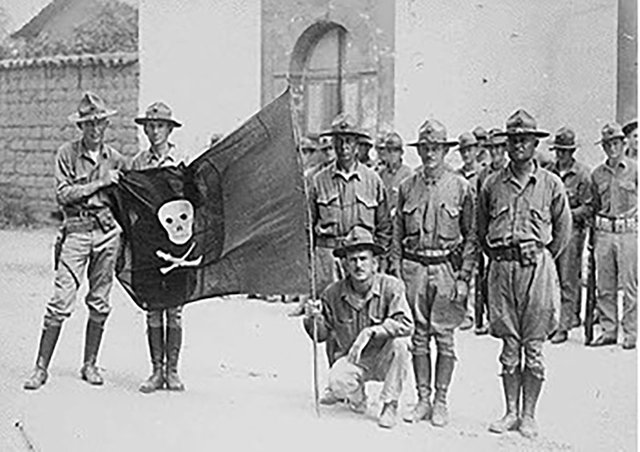
We lulled our enemies into thinking we weren’t a threat by carrying around that super cute flag!
Unsurprisingly, the opposition party and the business interests they represented, especially in the oil and gas industry, did not take kindly to this development. So much so that, in 2002, they attempted a coup. Chavez was removed by military force and a new president was sworn in. At that point, thousands of Chavez supporters (and people who were just angry at how he was removed from power) took over the state run television network to demand his return. Just 48 hours later, Chavez was back in office.
Here’s an important detail from the article I linked to in the previous paragraph. It notes that, prior to the coup attempt, snipers loyal to Chavez shot at the crowd and killed 16 people. You know what? That’s bad. Really bad. But keep reading and you’ll note that, when protests broke out over his ouster, the military shot dozens of protesters then as well. This is not a minor point, but I’ll put off talking about it more for just a bit.
In addition to surviving a coup, the early years of the Chavez reign was marked by obscene amounts of capital flight. That’s just what it sounds like: The capital you have as a country starts leaving your country en masse, to the detriment of your economy. This, at least in part, was a deliberate move by the opposition that often took the form of literally buying US dollars and moving them to offshore banks. The intent was to undermine the sweeping social reforms Chavez put in place, including a series of markets around the country where goods could be purchased at government-subsidized prices, making food readily available to countless citizens who had very little access to it previously.
Swish that around in your head a bit. One side loses an election, and their plan to regain power is to make sure people who are eating regularly for the first time in years go back to not eating regularly.
When that failed, they attempted a coup. When the coup failed, as mentioned previously, they shot at protesters before giving up.
This is the same opposition party we hope to bring back to power, with our state-sanctioned reasoning being that they’ll take better care of the Venezuelan people. Why? Because they’ve never wrecked the economy? Because they’ve never slaughtered protesters? They’ve done all of those things, and it wasn’t all that long ago.
Obviously, the “we” in the first sentence of that previous paragraph refers to the United States. We were never happy about Venezuela’s turn toward socialism, but things got significantly worse in 2007 when Chavez nationalized foreign oil company assets. Most companies operating in the country at the time accepted book value in return for their assets being taken. ExxonMobil did not. They wanted $6 billion in compensation. It went to trial. They lost and received significantly less. For the record, Rex Tillerson was the CEO of ExxonMobil at the time, and according to some sources, he’s held a grudge against Venezuela ever since. I suppose that part about Rex is just an unimportant side note. Moving on!
By that point, we’d already been funneling money and aid to Venezuelan opposition groups through a Washington-based NGO called Freedom House for a few years.
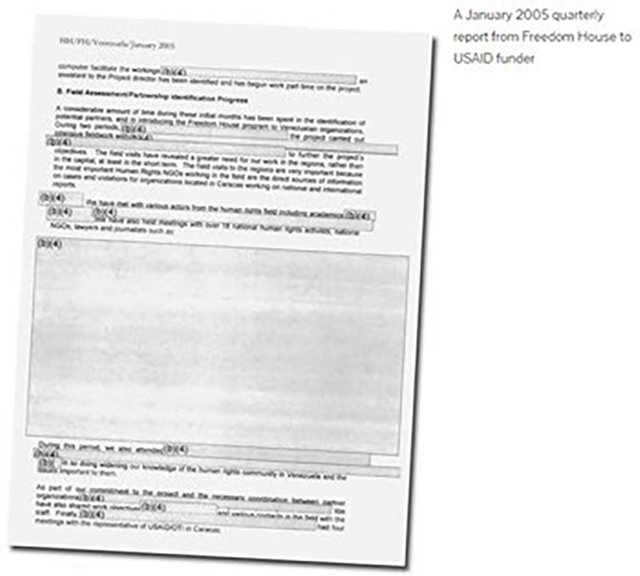
And we kept the receipts!
Even after the Chavez regime passed a law barring the US from sending aid to opposition groups, the money kept coming. Some sources put the amount we’ve spent to “promote democracy” in Venezuela at as much as $49 million since 2009.
Those are just a few of the extraordinary steps we’ve taken to intervene in that country’s economic and governmental affairs. Another was Obama’s 2015 Executive Order that labeled Venezuela a “serious threat to national security.” If that seems like a stretch, that’s because it definitely is, and a spokesman for the Obama administration admitted as much a few short weeks later.
Despite that admission, the order was extended in 2016 and definitely wasn’t among the Obama measures Trump overturned upon taking office. Quite the opposite, the current administration imposed five different waves of sanctions on Venezuela in 2017 alone and have since leveled up to threatening a full-on oil embargo if Maduro doesn’t step down.
Not to imply that this is anything more than coincidence, but it’s at least worth mentioning that everything in the above paragraph happened hot on the heels of the revelation that Venezuela has the largest oil reserves in the world. Maybe.
Are we trying to topple their government? Yes, we’re trying to topple their government. The head of the CIA, Mike Pompeo, said exactly that back in July. More recently, Rex Tillerson floated the idea that a coup in Venezuela could happen soon.
None of this is meant to imply that Chavez and Maduro represent the “good” side here. The social programs they put in place definitely helped people, but eventually they also became more of a tool to wield influence and maintain power than anything. The currency controls they put in place to stop capital flight also created a wave of corruption that probably seemed a lot more sustainable in the early-to-mid 2000s when oil prices were through the roof, but much less so when those prices plummeted. That short-sightedness has been a disaster for the people of Venezuela. There’s no arguing that, as far as leadership goes, they could do a lot better.
However, to imply that our increased interest in that country’s affairs has anything to do with the suffering of the people is an obvious lie. We’ve been actively participating in that suffering through a combination of economic support for the opposition and sanctions, and mostly because we don’t like the regime the people elected in 1998.
It’s not about human rights. It’s never about human rights. The United States wants to return to the days when the people running Venezuela cared about our business interests, and restoring the old guard is the shortest route we can take to get there. If they were just as incompetent and corrupt as the government we want removed, that’s fine. We just need them to respect our business interests.
So what then? Should the United States just do nothing about what’s happening in Venezuela right now? Well, yeah, kinda. If nothing else, we could just stop doing what we’re doing now, which is imposing sanctions and funding the opposition. Doing nothing seems a lot more humane than continuing to do that.
Don’t hold your breath waiting for us to just throw in the towel, though. In fact, keep a close eye on the news for mentions of Venezuela over the next month, specifically. Chances are you’ll see quite a few.
Why? Because Venezuela just launched a bold scheme to fix their money woes by introducing their own cyrptocurrency called petro.

Invest now (if you want the Trump administration to sanction your rent money someday)!
Each coin is (in theory) backed by an actual barrel of oil and, according to the Venezuelan government, a slew of other nations have already agreed to accept petros in returns for their goods. Depending on who you believe, either the pre-sale (which launched on February 20th) has been a rousing success or the entire idea is a total sham. Either way, the ICO (initial coin offering) happens on March 20th.
If the plan is successful, it will allow Venezuela to trade oil for essential goods without ever involving the US dollar, thereby circumventing the same sanctions the United States has been using to choke them out. If it works for them, there’s no reason it couldn’t work for any number of other countries currently in the throes of the United States sanctions process.
What are the chances the US government just decides to sit idly by over the next few weeks and let Venezuela potentially become the model for how to beat oil sanctions? Not likely. If it starts looking like the petrocoin is going to provide a legitimate financial windfall to the nation of Venezuela, don’t be too surprised if that oil embargo follows shortly thereafter to make sure that windfall doesn’t last long enough to reach the people.
Again, none of this is to imply that the leadership of Venezuela is blameless in their current crisis. It’s just a heads up that we aren’t really the good guys either, and that if you’re buying the “human rights” excuse just because it’s coming from your side this time, you should be ashamed.
Demand better lies from your leaders, America.
Hi! I am a robot. I just upvoted you! I found similar content that readers might be interested in:
https://medium.com/vandal-press/no-one-cares-about-venezuela-4626d8401631